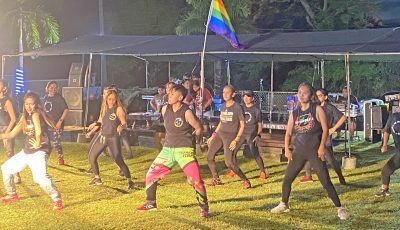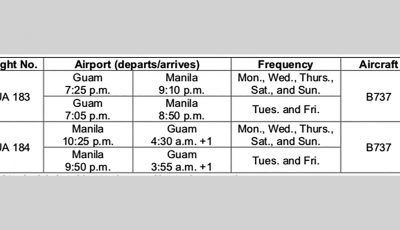Hope and 3 minutes can save your life
It only takes three minutes to get a dental examination but failing to have one leaves a far most lasting impact not only on yourself but also on your family.
This was the case of three women—Mami Ikeda, Carla Sablan, and Lanelle Okawa—who share the unhappy distinction of having lost three of their closest family members to the deadly disease of oral cancer.
Now the three are drawing on their heart-wrenching experiences in order to raise awareness of this disease, in the hope that people will listen to their story of how oral cancer impacted their family and their lives.

From left to right, Carla Sablan, Mami Ikeda, and Lanelle Okawa stand together for a group photo while holding up the laptop with a picture of their lost loved ones. In the laptop, from left to right, shows Jack, Kazu, and Roque Camacho. (Jayson Camacho)
Ikeda’s brother, Kazunori or “Kazu,” Sablan’s husband, Jack, and Okawa’s husband, Roque Camacho, passed away while battling oral cancer early last year.
While taking care of their loved ones, all three women became close in the Philippines where Kazu, Jack, and Roque were medically referred for treatment.
When all three of their loved ones passed away, Ikeda said their friendship just grew stronger together.
“We still meet every month and it really helps me. Each one of us, it was our first time to really have to give care to a cancer patient and each one of us went through so much when we went to the Philippines, including coming back,” Ikeda said.
Kazu, who passed away in February 2014, was Ikeda’s baby brother. He was her only family because both their parents have already passed away.
Ordeal
As far as Ikeda knows, oral cancer is the most aggressive cancer. Her brother’s case was very difficult because when he would finish treatment, the cancer would return in a more aggressive form.
“Every time a cycle finishes the swelling gets worse. At the end his lymph nodes were blocking all his fluids on his face and was forming a lymphedema, which shut his eyes close and made his whole head look like a balloon,” she said.
“With Kazu, Roque, and Jack, it was a battle of losing their abilities one by one. He first lost his job, the tumor was on his lip and he lost his upper lip, but still tried to eat as much as he could because he knew what the treatment did,” she added.
Kazu eventually lost his voice and his ability to eat and swallow, because the tumors were surrounding his neck and his chin. He couldn’t even open his mouth.
“He was so disoriented and at the end he didn’t know where he was or who he was,” Ikeda said.
Near the end, Ikeda made the hardest thing she has ever done in her life—to tell her brother to let go.
“No one deserves to go through what we went through. No family has to feel what we felt because no one deserves to go through this at all,” she said.
Okawa’s husband Roque passed away in April 2014—just two months after Kazu. She said that although Roque had passed away from oral cancer, the disease was foreign to her family.
“His journey started with pain in his mouth and a sore that developed in his inner left cheek. This sore did not heal over time, even with antibiotics. After about six months of coping with the pain, he finally decided to have himself checked, only to find out that he had stage 4 oral cancer,” Okawa said.
“For about three months, he underwent intensive chemo and radiation therapy. I stood by him and saw the pain and suffering he had to undergo just to get rid of the monster that was inside him. He fought a tough battle; unfortunately the cancer was progressive and did not give him a chance,” she added.
Today, Okawa asks herself all the time, “What if?” What if he got checked up sooner, would her husband have been alive to see their daughter’s fourth birthday or even her 16th for that matter?
What if he took better care of his oral health, would he have had a chance of surviving this type of cancer? Could he have had quit his chewing habit sooner and continue to be a part of their family or this campaign for that matter?
“All the what ifs, could haves, should haves can’t bring my husband back. But today I insist on helping other families so that they could still have the opportunity to make memories instead of remembering the memory of a loved one,” she said.
Sablan’s husband Jack passed away last June, two months after Roque. In May of 2013, Jack started to experience difficulty in opening his mouth. Sablan said that he noticed a deep ulcer in the back of his left cheek.
“He thought it was just a sore that would heal in time. He also started to have fevers. We went to see our doctor and he was given antibiotics for a week, which we thought would help, but didn’t,” she said.
A biopsy was recommended and done at the Seventh Day Adventist Dental Clinic and they got the result a day after Father’s Day.
“It was the most painful and devastating news. The first thing that came to our mind was how we’re we going to explain this to our children and family. We cried the whole drive home. Above all, we remained positive and optimistic that everything will be okay,” Sablan said.
Jack underwent several types of treatment, including surgery, chemotherapy, and radiation therapy—all in a period of about a year.
“Through it all, we kept our faith and we’re lovingly surrounded by our family and friends. We miss and love him dearly,” she said.
Hope
These three women found each other at a time when hope and comfort was sorely needed.
After the passing of their loved ones, they have been together providing outreaches and awareness to both young and old in the CNMI of the deadly disease that nearly broke them down.
All their message is to get screened if you chew and be aware that oral cancer can affect anyone.
They made their testimonials during the Oral Health Cancer Forum at the Pacific Islands Club last Tuesday that lasted from 8am to 4pm.



























